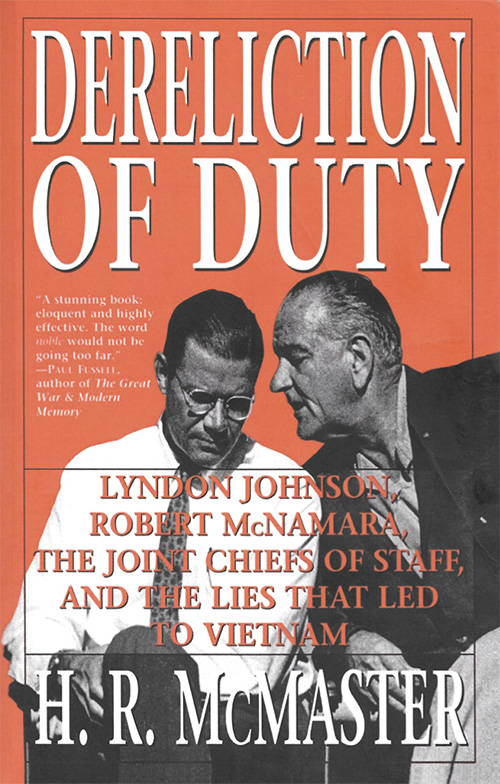Book Reviews

Dereliction of Duty: Lyndon Johnson, Robert McNamara, the Joint Chiefs of Staff, and the Lies That Led to Vietnam
by H.R. McMaster
New York: Harper Collins, 1997
446 pages, $20.20 (softcover)
ISBN 0-06-092908-1
For more information on accessing this file, please visit our help page.
Reviewed by Peter J. Williams
If the name of the author of this quite revealing, and indeed, shocking book sounds familiar, then it should. He is currently (July 2017) the National Security Advisor to the President of the United States of America. Herbert Raymond McMaster was a major at the time of writing this book, which was a result of part of his work toward his Ph. D. at the University of North Carolina, Chapel Hill.
The essential thesis of the book is that the war in Vietnam was not one that was forced upon the US, but one that was lost in Washington DC, “…even before Americans assumed sole responsibility for the fighting in 1965 and before they realized the country was at war…”1 The period covered by the book runs from 1962, when the US effort was largely of an advisory nature, to 1965, when an uprated level of American commitment was announced by President Johnson at a press conference. At that media event, LBJ announced that he would increase US troop levels in Vietnam to 125,000, leaving no-one in any doubt that, like it or not, and not withstanding later attempts at the so-called “Vietnamization” of the conflict, this was now America’s War.
We all know how this story ends, but the author does a very convincing job (in this reviewer’s opinion) of explaining how it started and then escalated. In the author’s view, the’ slide down the slippery slope’ in South-East Asia began under the Kennedy Administration, and as a result of the Cuban Missile Crisis. During that event, the advice of the Secretary of Defence, Robert McNamara (to institute an effective blockade) was accepted by JFK in the face of conflicting advice from the Joint Chiefs of Staff (JCS), who argued for more overt military action. McMaster then goes on to argue that a key outcome of the crisis was that the military advisors to the President and his administration, a role enshrined in law, were sidelined and marginalized, often only being consulted after an executive decision had been taken with respect to the deployment of military forces. Instead of thinking and acting strategically, those military advisors were often relegated to being, as we would now say, “in the weeds.”
The position of the JCS continued in this way under the succeeding Johnson Administration. This brought challenges of its own, including the author’s claim that LBJs preoccupation with his domestic agenda and the “Great Society” he envisaged, as well as his focus upon future elections, meant that insufficient attention was given to Vietnam. Further, US objectives in Vietnam never seemed to be clear. At one point, the President seemed to be overly fixated upon killing Viet Cong (a focus I has always thought came from the military alone), while at other times, some of LBJs senior civilian advisors were of the view that, “…if the United States demonstrated that it would use military force to support its foreign policy, its international stature would be enhanced, regardless of the outcome.”2 (reviewer’s emphasis). One wonders to what extent does such a view exist today in the corridors of power in the West? The author also asserts that Johnson and McNamara deceived Congress, and by extension, the US public, as to the level of US commitment and its cost.
As the title asserts, the JCS did not cover themselves in glory throughout the course of events described in the book, either. In McMaster’s view, their deliberations were often fraught with inter-service rivalry, dissension which their civilian masters appeared to exploit, nor did they normally speak with one voice, much less, a voice which would explain to the civilian leadership the possible consequences of US military actions. In not speaking truth to power, McMaster concludes that the JCS were also “derelict” in their duty.
Much to my surprise, Canada receives mention in this book. The Johnson administration used the Canadian emissary to the International Commission for Supervision and Control (Vietnam), Mr. J. Blair Seaborn, as a ‘go-between’ to pass on to Hanoi the aims and objectives of the US government, a strategy which was based upon “graduated pressure,” a concept advanced by McNamara, and in which the threat of the use of force was more important than its actual usage.3
The author cannot be faulted for either the depth or the breadth of his research. At the time of his writing, many of the relevant documents had been declassified, manuscript collections had been made available, and the official history of the JCS during the Vietnam War had just been written. Thus, the bibliography is weighted in favour of primary source documents, including numerous oral histories and personal papers of many of the dramatis personae, as well as transcripts of White House telephone conversations. Indeed, the author conducted several interviews himself, including those with General Westmoreland, the former in-theatre US Commander of Military Assistance Command Vietnam. Extensive Notes that run to 83 pages supplement the main text.
The Editor of this journal challenged me to demonstrate the relevance of a book written some 20 years ago to today’s Canadian defence reality. Given the fact that we have just had a new defence policy released, that the government is still considering options for the deployment of Canadian soldiers and police on United Nations peacekeeping missions, the interplay between our military leadership and our government regarding future missions remains worthy of consideration and analysis. I found that as I read this book, many of the issues I has grappled with when serving, in particular, following a “whole of government approach,” translating government direction into military tasks, and assessing mission progress, kept coming up again and again as America’s engagement in South-East Asia in the early-1960s was analyzed.
This book is strongly recommended to our senior military and civilian leaders, and to journalists, who will be challenging these same leaders as to the ‘whys and wherefores’ of future Canadian military commitments overseas. I would also hope that the author himself returns to the pages of this instructive book from time to time, lest he be accused of joining the ranks of the “silent men” he so damningly decries herein.
Colonel (Ret’d) Peter J. Williams is currently the Executive Director of the Royal Canadian Artillery Association
Notes
- H.R. McMaster, Dereliction of Duty: Lyndon Johnson, Robert McNamara, the Joint Chiefs of Staff, and the Lies That Led to Vietnam (New York: Harper Collins, 1997), p. 333.
- Ibid., p. 181.
- Ibid., p. 159.







